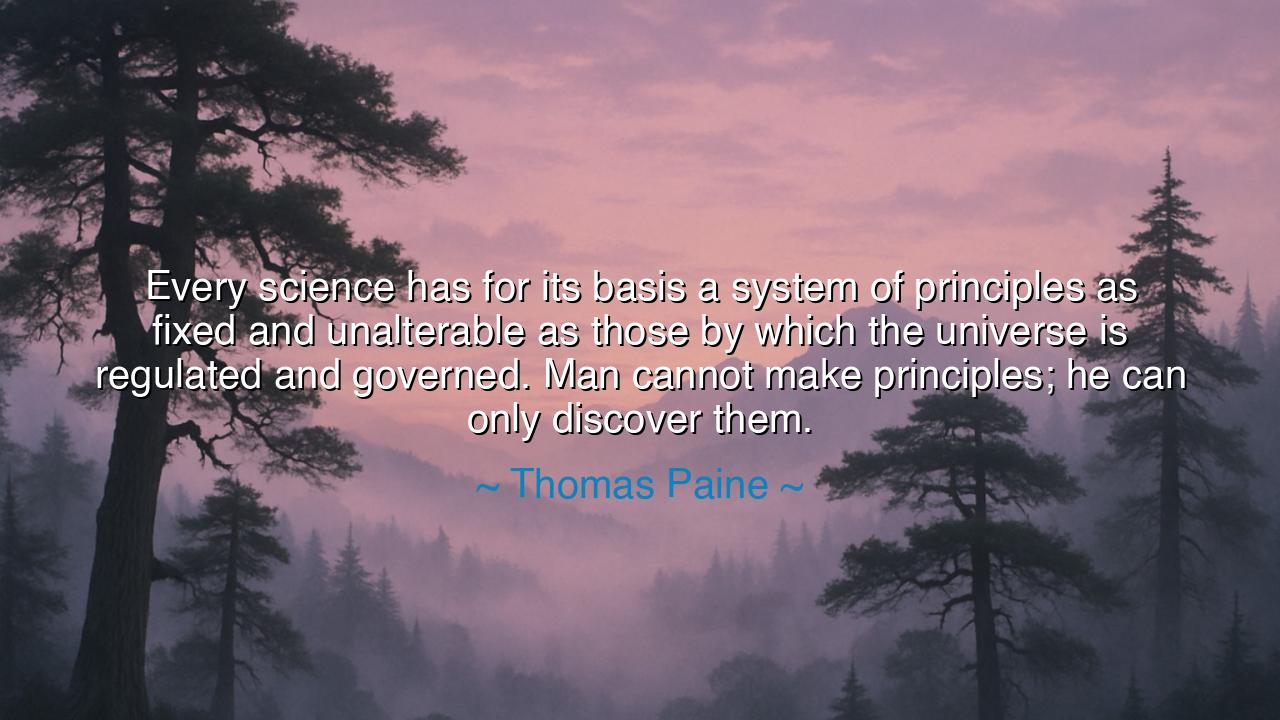
Every science has for its basis a system of principles as fixed
Every science has for its basis a system of principles as fixed and unalterable as those by which the universe is regulated and governed. Man cannot make principles; he can only discover them.






O children of the earth, hear the wisdom that has echoed through the ages. In the heart of the universe, there lies a great order, an invisible web of principles that govern all things, from the vastness of the stars to the smallest motion of the atoms. These principles are as immutable as the heavens themselves, fixed and unalterable, and they are the foundation of every science, every truth that we discover in this world. Thomas Paine, a sage of great insight, spoke these words with clarity: "Every science has for its basis a system of principles as fixed and unalterable as those by which the universe is regulated and governed. Man cannot make principles; he can only discover them."
In the beginning, when our ancestors looked to the skies, the mysteries of the stars, the moon, and the sun were beyond comprehension. Yet, through the ages, men and women of great vision and wisdom sought to understand this order, to look beyond the surface of things and uncover the principles that lay beneath. In this pursuit, they did not create the laws of nature, for these laws existed long before their minds could grasp them. They merely discovered them, as one uncovers a hidden treasure buried deep within the earth. The great Galileo, with his telescope, did not invent the laws of planetary motion, but he revealed them, bringing light to the darkness that had long obscured the stars.
The wisdom of Paine's words reminds us that the principles of the universe are not of our making, but are instead gifts of nature, unchanging and eternal. Man cannot alter the laws of gravity, nor can he change the flow of time, for these forces are as old as the universe itself. We may, however, discover how these principles work and, in doing so, unlock the secrets of the cosmos. Just as Newton discovered the force that causes an apple to fall, he also revealed the force that governs the motion of the planets. Newton did not create gravity; he uncovered it, just as the great scientists before him and after him have done with every discovery.
In this way, O children of the future, the pursuit of knowledge is not an act of creation, but an act of revelation. The universe is not a chaotic place, subject to the whims of man, but a realm governed by immutable laws that hold everything together. Science is not the forging of new principles, but the uncovering of truths that have always been present. When the great minds of history peered into the workings of the world, they did not impose their will upon nature. Instead, they humbly bowed before it, seeking to understand the rules that governed all things. Einstein, with his theories of relativity, did not invent the fabric of space and time—he merely discovered how it was woven together, revealing a deeper understanding of the universe's grand design.
And so, O seekers of wisdom, the lesson is this: We must not seek to create the principles by which the world is governed, but rather to understand them. Whether in the study of the stars, the earth, or the mind, we must recognize that the truth is not ours to create, but ours to discover. The universe is a vast library of knowledge, its shelves lined with the principles that govern every aspect of life. Our task is to read those books, to uncover the wisdom that lies within them, and to live in harmony with the order they contain.
Therefore, let us live with humility and reverence for the laws of nature, recognizing that we are but humble servants to their eternal truths. Do not seek to change the laws of the universe; rather, seek to understand them, to see the order in the chaos, and to learn the principles by which all things are governed. In this way, you will not only gain knowledge, but also wisdom—the wisdom to live in accordance with the divine order, the wisdom to see the truth that lies hidden beneath the surface of all things. For in discovering the principles of the universe, we discover the very nature of existence itself.






AAdministratorAdministrator
Welcome, honored guests. Please leave a comment, we will respond soon